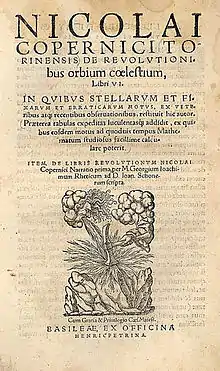Jagiellonian Library
Jagiellonian Library (Polish: Biblioteka Jagiellońska, popular nickname Jagiellonka) is the library of the Jagiellonian University in Kraków and with almost 6.7 million volumes, one of the largest libraries in Poland, serving as a public library, university library and part of the Polish national library system.[2] It has a large collection of medieval manuscripts, for example Copernicus' De Revolutionibus and Jan Długosz's Banderia Prutenorum, and a large collection of underground literature (so-called drugi obieg or samizdat) from the period of communist rule in Poland (1945–1989). The Jagiellonian also houses the Berlinka art collection, whose legal status is in dispute with Germany.[3]
| Biblioteka Jagiellońska | |
 | |
 Main entrance to the library | |
| Country | Poland |
|---|---|
| Type | National library |
| Established | 1364 |
| Location | Kraków |
| Coordinates | 50.0615°N 19.9236°E |
| Collection | |
| Size | 6,603,824[1] |
| Access and use | |
| Circulation | 600,198 in reading rooms and outside |
| Other information | |
| Director | Prof. dr hab. Zdzisław Pietrzyk |
| Website | www |
| Map | |

| |
Organization
The Deputy Directors of Administration and Construction, 19th and 20th Century Materials, and Special Collections oversee a staff of 283 employees in fourteen different library departments.[4]
Collections
.jpg.webp)

Jagiellonian Library is one of the largest and most famous libraries in Poland; over its history it has received many donations and inherited many private collections.[4]
Its collection contains 1,503,178 volumes of monographs, 557,199 volumes of periodicals, 104,012 early printed books, 3,586 incunabula, 24,258 manuscripts, 12,819 maps, 35,105 music scores, and 77,336 microforms.[4] Among its music scores are many of Mozart's original autographs.
Notable rare books owned by the library include:
- 15th century copy of Bogurodzica
- Jan Długosz – Banderia Prutenorum
- Balthasar Behem Codex
- Paulus Paulirini de Praga – Liber viginti artium
- Nicolaus Copernicus – manuscript of De revolutionibus, and printed editions
- Rembrandt van Rijn – Faust
- Frédéric Chopin – Scherzo (E-dur)
- Stanisław Moniuszko – Trzeci śpiewnik domowy. Muzyka wokalna z towarzyszeniem fortepianu
- Stanisław Wyspiański – Wesele. Dramat w 3 aktach
- Ignacy Jan Paderewski – Stara Suita
In the 1990s several priceless books were stolen from the library, presumably in order to be sold in the West. In 1999 works of Galileo, Johannes Kepler and Basilius Bessarion were stolen; some were recovered from an auction in the German auction house Reiss&Sohn.
History
The beginning of the Jagiellonian Library is traditionally considered the same as that of the entire university (then known as Cracow Academy) - in the year 1364;[4] however instead of having one central library it had several smaller branches at buildings of various departments (the largest collection was in Collegium Maius, where works related to theology and liberal arts were kept). After 1775, during the reforms of Komisja Edukacji Narodowej, which established the first Ministry of Education in the world, various small libraries of the University were formally centralized into one public collection in Collegium Maius. During the partitions of Poland, the library continued to grow thanks to the support of such people as Jerzy Samuel Bandtkie, Karol Józef Teofil Estreicher and Karol Estreicher. Its collections were made public in 1812. Since 1932, it has had the right to receive a copy of any book issued by Polish publishers within Poland. In 1940, the library finally obtained a new building of its own. During the Second World War, library workers cooperated with underground universities. Since the 1990s, the library's collection is increasingly digital.
Building
The current building of the library located at Al. Mickiewicza 22 was constructed in the years 1931-1939 and expanded twice, in the years 1961-1963 and 1995-2001.
Thefts from the collections
There has been endemic theft of incunabula and antiquarian books from the Library. One of the worst such outbreaks in Poland was made public in April 1999. It included the theft of works by Galileo Galilei, Johannes Kepler and Bessarion. Part of the stolen haul turned up in the German auction house, Reiss & Sohn. It remains unclear who was behind the operation.[5]
See also
References
- Website of the library, "Archived copy". Archived from the original on 2011-07-18. Retrieved 2010-08-20.CS1 maint: archived copy as title (link), last accessed August 20, 2010
- Official national library of Poland is the National Library of Poland in Warsaw; however Jagiellonian Library is considered a part of the Narodowy Zasób Biblioteczny. It was the National Library before the creation of the National Library in Warsaw, and today it contains the National Library collection for the period before 1801.
- Hermes Malopolska, Zbiory Berlinki w Krakowie, last accessed August 18, 2010
- Visiting the Biblioteka Jagiellonska (Jagiellonian Library) in Cracow Archived 2005-09-08 at the Wayback Machine. Last accessed on 4 May 2007.
- "Kradzież w Bibliotece Jagiellońskiej". dziennikpolski24.pl (in Polish). Retrieved 2018-01-23.
Further reading
- * Maria J. Nowak (Winter 1997). "The History of the Jagiellonian Library". Libraries & Culture. USA. 32.
External links
| Wikimedia Commons has media related to Biblioteka Jagiellońska. |
- THE JAGELLONIAN LIBRARY IN CRACOW
- (in English) Jagiellonian Library of the Jagiellonian University
- (in Polish) Strona internetowa Biblioteki Jagiellońskiej
- (in Polish) Biblioteka Jagiellońska – culture.pl
- (in Polish) Biblioteka Jagiellońska – Nauka Polska
- (in Polish) Biblioteka Jagiellońska – Encyklopedia WIEM
- (in Polish) Biblioteka Jagiellońska – Encyklopedia Interia

